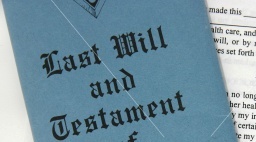An introduction to Bequests
An introduction to Bequests

Bequests
A bequest is a gift made in the donor's will.
Such gifts can take a number of forms, including a lump sum of money, a named percentage or portion of the donor's estate, a portion of the residue (amount left after expenses, taxes, and other bequests have been paid) of the donor's estate, a gift of securities, a gift of real estate or personal property, or any of these subject to a contingency such as the donor not being survived by spouse and children.
Some donors create a trust in their will (a testamentary trust) which pays income to a spouse or other family member for life or for a term of years, after which the trust remainder is distributed to the charity or non-profit organization.

Bequests can be made for various purposes. Some donors prefer to let the charity decide how to use the funds according to the most urgent needs of the time. Others prefer to direct the funds to an endowment or specific programs offered by the charity. Many charities prefer to be the ones to decide where the money should be directed.

Benefits to the donor
The donor has the satisfaction of creating a significant legacy that will implement the donor's vision of a better future by helping others and by protecting the environment.
The donor retains full control of the gifted property while alive and can change the will at any time as long as he or she has full mental capacity. Only a modest outlay of capital is required for professional fees in planning the estate and preparing
the documentation.

Tax savings to the estate: a donation receipt may be issued to the donor's estate for the amount of cash left to the charity or for the fair market value of other property given, resulting in a tax credit on the donor''s final income tax return.
In the year of death, a gift to a charity can reduce the taxes owed by the donor's estate by up to 100% of the donor's net income. Contributions exceeding that limit may be carried back to the preceding year to reduce taxes paid in the preceding year, subject to the same limit.
While some bequests are complex (depending on the donor's personal situation and wishes) others are remarkably simple and easy to establish with professional assistance. Some gifts are large, others small, but almost everyone can participate in this
form of giving.

Benefits to the charity
- Bequests tend to be larger than outright gifts.
- Many bequests have relatively few restrictions.
- Most bequests can be put to use immediately after they are received.
- The charity can expect to receive a future gift, if the will is not changed.
Who
Adults of any age and of sound mind. Often, people make charitable gifts when revising their wills. Planning opportunities also arise as life's milestones are reached, including the age when RRSPs must be converted.
How
The donor instructs his or her lawyer regarding the charitable bequest. The lawyer prepares a new will or an amendment to the donor's existing will (a Codicil). To be effective, the new will or amendment must be properly signed and witnessed in accordance with strict legal requirements.